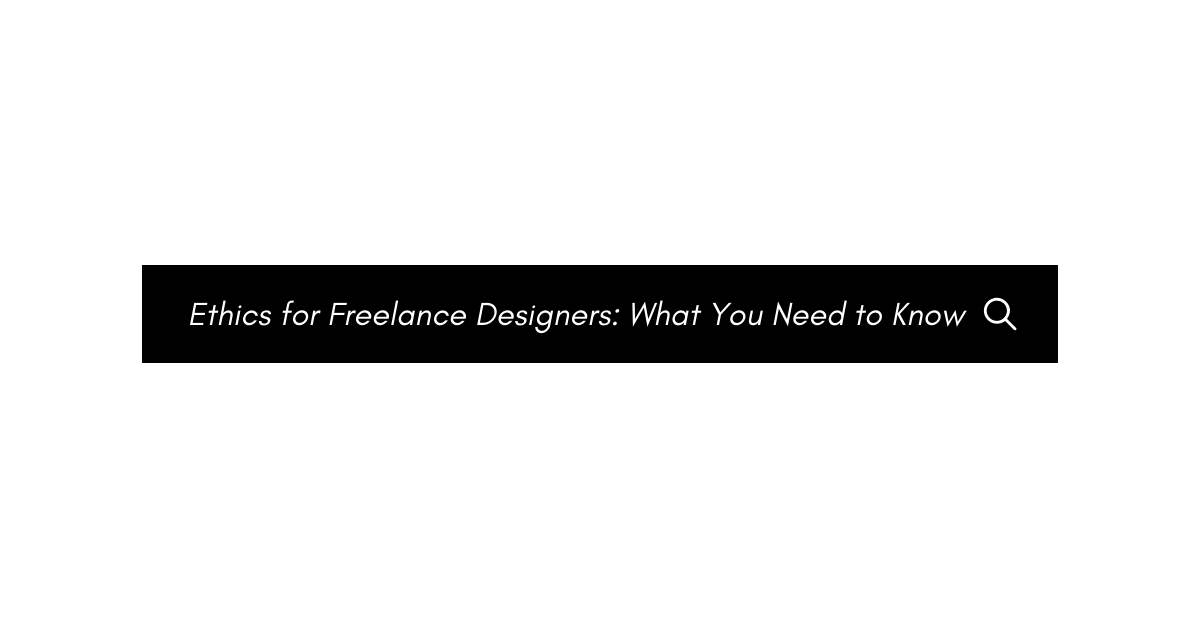As freelance designers, you’re constantly interacting with clients and working on new projects. With all of this activity, it’s important to be aware of the ethical considerations that come along with your profession. As a freelance designer, you are likely to encounter ethical dilemmas from time to time. To help you navigate these challenges, here are some things to keep in mind:
Transparency
Be transparent with your clients One of the most important things you can do is be upfront and honest with your clients about your process, your rates, and your expectations. If you are transparent from the beginning, it will be easier to avoid any potential ethical pitfalls later on.
Needs
Understand your client’s needs Before you start work on a project, make sure you understand your client’s needs and expectations. Ask questions and get clarification so that you can be sure you are meeting their needs.
Promises
Once you’ve made a promise to a client, do everything in your power to keep it. If you can’t keep a promise, be honest with the client and let them know as soon as possible.
Professional
Your clients are hiring you because they need a professional to help them with their project. As such, it’s important that you act and communicate in a professional manner at all times. This includes being respectful, prompt, and clear in your communications.
Budget
Respect your client’s budget Your client has a budget for a reason, so be respectful of that. Don’t try to upsell them on products or services they don’t need or can’t afford.
Plagiarize
Be professional No matter what, always be professional in your dealings with clients. This means being punctual, meeting deadlines, and communicating effectively. Don’t plagiarize It goes without saying, but plagiarism is a big no-no in the design world. Always give credit where it’s due and make sure you are creating original work.
Conflict of Interest
How do you handle a potential client when they are seeking the same results as an existing client, but you can only deliver those results to one client – will you prevent the other from attaining them? (Think, for example, SEO on a website – if you achieve top ranking for one dentist in your neighborhood, you can’t repeat that for another.) A sea of potential conflicts of interest can be found in freelance life.
Dodgy Clients
How do you deal with a potential client who promotes smoking in the developing world? What about one who sells guns? A lot depends on where you feel your own ethical responsibilities lie. If you don’t get paid, how will you respond? You can always leave the client a bad review, but is airing your dirty laundry in public a good idea? How will it impact on your own business? Might you appear petty? Worse, might lashing out make them leave you nasty feedback?
Outsourcing Conundrums
A client asks you to work on a big project; in fact, it’s too big for you to handle. You know you can outsource some of the work and get the job done easily enough. Should you tell the client about the act of outsourcing or claim all the work as your own? When should you tell the client—before the work is done or afterwards?
Conclusion
These are just a few things to keep in mind when it comes to ethics for freelance designers. By following these guidelines, you can help ensure that you are providing your clients with the best possible service. In conclusion, it is important for freelance designers to have a strong understanding of ethics in order to maintain a successful and reputable business. By understanding the basics of ethics, designers can avoid potential legal issues, maintain strong client relationships, and uphold the standards of the design industry. Visit Artmeet.my

